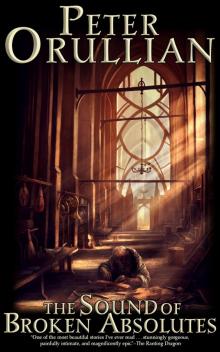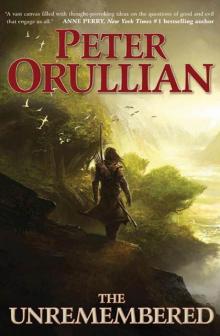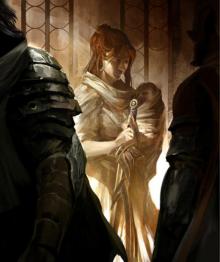- Home
- Peter Orullian
The Hell of It Page 2
The Hell of It Read online
Page 2
Malen didn’t have an answer for this. Not one the boy would want to hear or understand, anyway. Work was scarce. And itinerant laborers needed a solid skill if they hoped to succeed when moving to a new city to find work—word was that crowds of men waited on what few jobs came along. Which meant moving inland wasn’t really an option for Malen. And finding another port to scrub decks … that wouldn’t make a life any more than it had here. In Malen’s silence, Roth pushed on, seeming to think his da needed more information to offer a solution.
“Her ma can’t stop it. The mack-men threaten to do the same to Bryen … and his little sister, Jemma.” Roth’s words grew sharp with anger. “And the mayor’s men don’t seem to care, since she’s not paying tax. Bryen and his family sleep in the nook beneath the Dyer’s-side pier. His ma’s afraid to leave her family to go find work. She’s worried about what might happen while she’s gone.”
Roth stopped, wiping his eyes with his sleeve and visibly holding down a sob. “She’s got a tin cup. She sits outside the taverns along the lower harbor. Clean-boot places.” His son looked down again. “She begs, Da. She says mercies to passing folk, so that her other kids don’t get taken. I’ve seen it. I’ve seen a plug or two drop in her cup. I’ve seen mean, drunken men lash her face for sport. Mostly,” and his eyes returned again to Malen, begging some relief, “mostly they ignore her. Mostly they walk by like she’s wharf-drift. Like she’s not there. Like they can’t hear her or see that she’s got kids … like me.”
Malen got up, went around the table, and put his large, rough hands on the boy’s shoulders. He meant to offer some reassuring words. Fathers do that. They stand between childhood and the harsh ways of greedy men, whether those men wear uniforms or leathers with week-old meal-stains. Except that it was too late for reassurance. All this had already gotten inside his boy. There was nothing to be done about that. And Malen wouldn’t lie or try to refashion hard truths his son had learned too young.
Instead, he hunkered down so he could look up into his son’s face. “Listen to me. Your da won’t let that happen to us. It’ll be rough. But we’re rough men, aren’t we? We can handle anything. And I have an idea for us. It’s going to mean parting with some things that will be hard to part with. But things aren’t family. And your da knows a way—a hard way, mind you—but a way to keep us going a while.”
He tried a smile, and coaxed a return grin from Roth, who sniffed and nodded.
“Trust me a league more.” He squeezed the boy’s leg to instill a smidge of confidence. “We’re going to get through.”
And he did have an idea. A painful one. Risky, too. And it meant breaking a promise. But he’d come to believe that sometimes oaths and laws ceased to apply, like when stealing bread for a hungry child. Even the abandoning gods, who’d forsaken this world rather than govern it, wouldn’t condemn a man for that, would they? Even they, whose charter of principles had led them to believe the world was lost, even they would have shown him some mercy.
* * *
Malen knelt beside his bed, his elbows resting on the thin straw mattress. Across from him, Roth had done the same, looking like nothing so much as a younger Marta. Between them, neatly laid side by side, were Marta’s nice things. They were the small tokens that had made her feel pretty, made her feel more than a scullery maid.
One was a thin silver ring, something she’d carried with her into marriage. It had been her mother’s wedding ring. Marta’s father had been lost at sea—a deep-water sail-fish man—and so her mother had graciously given it to Malen to present to her daughter as her betrothal ring.
Beside it lay an ivory pinch-comb. Pinch-combs were a fashion for folks with clean boots. Not wharf-drift. He smiled fondly at the memories of Marta wearing it. She’d always put her hair up most delicately when she wanted to feel feminine, allowing a curl or two to fall out of the comb to gently caress her neck. He half-believed the whole purpose was so that he could softly remove the comb when their talking was all through. That was a fine moment, feeling her hair tumble down over his rough hands and across her neck and shoulders. What he wouldn’t give to feel it one more time.
Next to the pinch-comb lay a thin rosewood flute. Recorder, Marta would always correct him. It might have been a hand and a half in length. Plenty big for her small, delicate fingers. The instrument had six holes on top, two beneath, and held a bit of luster still. No surprise. Every full and perfect moon, Malen took out the flute and with slow and deliberate care rubbed it with a rose-oil rag. He never tried to play, or even put his lips to it to touch where Marta’s lips had been. Pity that Roth had never gotten to hear one of her evening tunes. Never rushed, they seemed to keep the meaning of the instrument’s name—Marta had liked to remind Malen that recorder also meant rememberer.
In some ways, even more than the pinch-comb, the recorder alluded to a life they’d only ever dreamed about. While scops played taverns all along the wharf, talented musicians found their way to courts, or better still, conservatories. Marta had enough of an ear to understand the value of well-played notes. Enough of an ear to know that well-played notes were more than music. And there were colleges in Masson Dimn, Vohnce, and elsewhere that taught the truths inside those notes. When she’d played her little flute, Malen had heard her poet’s heart reaching out for that understanding.
The last of her nice things was the hardest to look at. And would be the hardest to part with. He gave Roth a long look, trying to keep the regret from his face. With trembling hands, he fingered open the tiny clasp and drew back the lid. The pleasant smell of cedar filled the small space between him and his son as they looked down on a used pen set. Used, as in not new. Marta had never had the chance to put it to her own use.
It had been a gift he’d intended to give her after Roth was born. Since their first meeting, she’d talked about writing down poems and thoughts and fables of her own making. She practiced on him in the evening hours when they’d lain together in bed. She’d liked the musical way of words, and thought someday it might be a delight to write down her best efforts and fashion them into a book. But a poet’s tools were expensive to come by. Especially when three days in ten she and Malen were boiling free butcher bones to make broth for supper.
He tenderly touched the pen. The vial of ink was so small it might scarcely have held enough ink to write a single sonnet. And the clever sander had been fashioned to look like the face of Angeline, the fabled muse of lilac and lion. He’d meant to encourage her to pen her poems. He’d meant to see to it that others could hear the music in her words. It was a thank you for standing beside him, one she’d never known about. She went to her earth before he could give it to her.
She would have liked it. She would have put her hair up, so it could be taken down. He smiled sadly, and looked up into the face of his son, still a picture of his mother.
“Are you sure, Da?” Roth asked.
Malen felt like crying. Emotions swept through him at dizzying speeds, upsetting even an old trawler-deck man. “They’re nice things. Your mother’s things. But like I said, things aren’t family. If she were here, she’d hesh me for dawdling then slap my ass to get to a skiller and price them in for coin.”
Roth’s mouth quirked in a sweet smile. Probably over his ass comment.
“Besides,” Malen said, “it’s the memories they stir that matter. And a sorry set we’d be if we needed them to keep her in mind, wouldn’t you agree?”
The boy nodded. “Are you going now? Aren’t the skillers all closed? Anyone taking a pawn at this hour isn’t going to give you good trade.”
It was true. Reputable skillers kept reputable hours, even on the wharf. Men who traded goods by moonlight were pushing ill-gotten gains or buying cheap what had been stolen. Roth knowing this was just another sad reminder of their circumstance. It made him wonder if his boy had guessed at his true intent—where else did you go with nice things in these hours of evening?
“I’ll find a worthy buyer,” he said, maintai
ning a bettor’s composure.
He sighed heavily, closed the cedar-box lid, and drew in the corners of the cloth to bundle up Marta’s nice things again. If it weren’t for the new levies, he probably wouldn’t need to do this thing. In all likelihood, the Leagueman he’d brushed by on his way to see Captain Lowell had been there to collect the city’s purse, leaving the captain with no option but to trim his crew.
“Pull down the brace when I leave, and get yourself to bed at a decent hour. Hear me?”
Roth nodded again. He came around and gave Malen a shoulder hug. Malen returned the lad a firm embrace, and held on to it for as long as he could. Then he got to his feet.
“We’re rough men,” he said softly, and winked.
Roth winked back. “Rough men don’t wink,” he said, and giggled.
Malen belly-laughed, and got going. Out the door and down the road a piece, he turned not left toward the skiller shops, but right toward the harbor. Toward the riverboat he knew was moored along the Saelish pier. Where he’d do his level best to resurrect his skill as a man of chance.
* * *
The riverboat teemed with bettors and whores and cardsharps and gamble-makers and men hired to keep fights brief. Laughter and scowls and jangling lutes filled the air as Malen approached. His heart began to thump a mighty pattern. He’d put all this away at Marta’s insistence when he’d given her the ring he now carried in the bundle slung at his waist. A ring that might fetch a bag of meal, or half a silver in a skiller’s shop, where booty turned back a tenth its value. But a sharp wit with odds could make a thing worth a hundred times its purchase price. And Malen had been damned good at it in what he thought of as his net years—when his back could handle sea-work.
And he wouldn’t deny the bit of thrill it gave him, coursing again now in his middle-years blood.
At the plank that ran onto the boat, three men milled like tethered, restless sentry hounds. A finely dressed couple—they both wore hats—had just boarded, as Malen approached the men.
Rather disinterestedly, the tallest man sized him up, his eyes quick and appraising. “Three plugs.”
This was new. Years ago, when he’d frequented the gambling barges, the only boarding requirement had been that you didn’t carry onto the boat anything you could get foolish with if your luck spoiled—knives, knuckle-punches. Usually, a heavily oiled deck locker—the kinds used to store perishables—sat dockside, where it was repurposed to hold such things while you played your chances. But an actual fare?
Malen had only Marta’s four nice things. And he’d need them all for actual wagers. He thought quickly. The dock hound had seemed to make a bidder’s assessment of him. Which the man wouldn’t have needed to do if the price to board was standard.
Malen took a step to one side and called over the railing to the elegantly dressed couple now striding the deck. “Excuse me. You there.” They continued to walk, unaware he was calling to them, in particular. “You, with the two-feather hat.”
The woman stopped and turned back, a question in her face. Her man, arm linked with hers, was jerked to a stop, and stared back with irritation.
“I’m sorry to bother you,” Malen said, bowing in apology, “But may I ask, did you pay more than six plugs to board?”
The gentleman turned to face him fully, just as the three dock hounds laid hold of Malen.
Quickly he shouted out, “Please just tell these fine men that your coin also paid my way. I’m sure they mean no harm.”
The woman’s face tightened in understanding a half-moment before her gentleman’s did.
“Well, indeed. We’re not half-wits. And you’re terribly slow. Now, hurry.” The woman made an almost comically scolding gesture, wagging her finger. Malen nearly smiled, seeing how much she relished playing her impromptu role.
“You heard the woman,” Malen said quietly. “Or do I have my lady fair go in and find someone who might care that you’re fleecing the gamesters before they can come aboard? Less coin for those who pay your wage to troll the plank, isn’t it?”
The tall man pulled Malen’s face into his, so that their noses mashed together. The fellow glared, his eyes perfectly still. Then he sniffed, and Malen felt it in his own nose. Finally, the man muttered, his lips so close Malen could feel his breath. “You’re too desperate. It will please me to watch you walk away out-at-the-pockets. Or go over the side into the drink when you can’t pay a mark.”
They let him go, and Malen nodded gratitude before high-stepping across and onto the riverboat. The woman with the two-feather hat kept up appearances, reproving him lightly as they walked through the first-deck doors together.
“Thank you,” he said, once they were safely out of view of the dock hounds. “And if you care, anything more than a thin plug each is more than you should have paid. The boat’s straw-boss can see you get it back.”
The woman patted Malen’s shoulder. “We plungers must stick together. River’s luck to you.”
Malen bowed slightly. “River’s luck to you, too.” Plungers. That was the word heavy-purse and clean-boot folk used to refer to themselves when they came a-gamblin’. For them, it had to do with condescending to the places where they could play at chances. Its original meaning was a reference to those who went over the rails into the river when they failed to pay a mark. He couldn’t fault her for knowing only one side of the word’s meaning. And she’d done him a kindness. He was half-tempted to warn them, too. Their mistaken sense of a bettors’ fraternity would likely cost them dearly, since no such thing existed. It was a telltale sign of their inexperience in a place like this.
He settled on “Be careful,” and moved into the first room.
There were two paths open to him. There’d be an exchange table, where he could put down items and a man roughly equivalent to a skiller would push him back a handful of coins for the tables. But the return on Marta’s nice things would be even less here than in the skiller shops. So he didn’t bother seeking exchange.
Which left the straw-boss. Somewhere onboard there’d be a man who laid down house rules and kept a private table for his own games and stakes. He’d be a man who didn’t have much use anymore for coin; the game would be the thing. And he’d be happy to make liberal valuations of Marta’s nice things, if he thought the game Malen proposed was interesting enough. Or so Malen hoped.
He wound his way through the haze of tobacco smoke puffing up from pipes and leaf-rolls. Men and women generally had one hand around a cup or mug and the other alternating between their game and the body of someone close enough to grope. There were boards of dice, tri-stick throwing games, a variety of plackard tables, number grids, and new sports with spinners and marbles.
But for all the chances being played, no one man seemed to hold himself separate from it all. No corner boasted a neat table where bettors wore long sleeves with starch-stiffened cuffs rolled back once—the gentry’s way of adopting a common appearance.
Malen found the stairs and went up a level. Which was smokier, if that was possible. And the coin stacks taller, the laughter over wins and losses louder. But he still hadn’t seen anyone looking aloof enough to be a straw-boss. So: up again, to the third deck. Here, the laughter was softer, but the smiles sharper, more wicked and insinuating. Here, bets were mostly made with markers—promissory notes that carried more weight than a barrel of thin plugs. And the tobacco had a sweet tinge to it. This was imported leaf, or dyed with cherry-stone bitters.
He wound slowly through the haze, watching men and women whose eyes held sharp looks. They played plackard games of immense complexity—High-Bow Check-Down, Three and Eight, Six and Gain. It was said only mathematicians out of Aubade Grove would ever master these gambles.
And it made him wonder. Why were the riverboats tolerated at all? It seemed to him that their whole purpose ran counter to League reform. They encouraged the citizenry to take financial risk, place hope in something beyond their control, rather than self-sufficiency wrought by learning in
League schools. Why did the League suffer these barges and their temptations?
Before he could think more on it, he saw, through the smoke, what he’d been looking for. In the far corner, set apart by a waist-high wall, stood a table. A man and woman were seated there, grimly watching another man, whose hat had three feathers and was tipped so far back it was in danger of falling off. There could be no question: the straw-boss.
Malen’s blood began to race, and he put a protective hand around the bag at his waist holding Marta’s nice things. He squeezed once, gently, then went to the table. Two men just inside the low wall eyed him closely, gauging what threat he might pose. When he did nothing more than watch the current game play out, they relaxed hands that had edged close to weapon belts.
The gamblers here bantered very little. Impassive faces around the table watched every move of the others with careful scrutiny. There was the occasional thin smile. These may or may not have indicated the strength of down placks that the others couldn’t see. The wiles of sharp chancers. And here, not a single coin graced the table. Only slips of paper with written promises. From where he stood, Malen couldn’t read the offerings, but if history was any indication, these weren’t about coin or even rare metal. These would be favors, maybe physical voluntaries. The holder of such a marker could call it due when it was most advantageous to him, or when he needed a bedfellow, depending on the note.
He knew the game they played—a variant on High Dash. But really, the cards were immaterial. At this level, the gambler played the person. And the straw-boss appeared to be more than expert. Some of that, Malen guessed, probably stemmed from the fact that the man was in want of nothing. If losing had no impact on your life when you stood up from the table, then emotion never played you false. But then, the thrill would have gone out of it for him, too.
In a very real way, that’s what Malen was banking on.

 At the Manger
At the Manger The Sound of Broken Absolutes
The Sound of Broken Absolutes The Unremembered: Book One of The Vault of Heaven
The Unremembered: Book One of The Vault of Heaven The Hell of It
The Hell of It Trial of Intentions
Trial of Intentions The Great Defense of Layosah
The Great Defense of Layosah Sacrifice of the First Sheason
Sacrifice of the First Sheason The Unremembered
The Unremembered